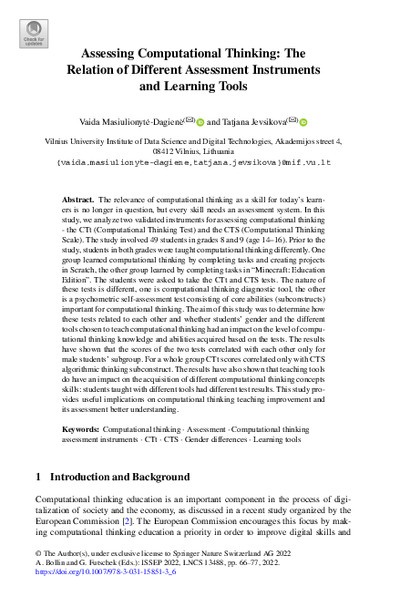Assessing Computational ThinkingThe Relation of Different Assessment Instruments and Learning Tools
Vaida Masiulionytė-Dagienė, Tatjana Jevsikova
|
 |
 Diese Seite wurde seit 2 Jahren inhaltlich nicht mehr aktualisiert.
Unter Umständen ist sie nicht mehr aktuell.
Diese Seite wurde seit 2 Jahren inhaltlich nicht mehr aktualisiert.
Unter Umständen ist sie nicht mehr aktuell.
 Zusammenfassungen
Zusammenfassungen
 The relevance of computational thinking as a skill for today's learners is no longer in question, but every skill needs an assessment system. In this study, we analyze two validated instruments for assessing computational thinking - the CTt (Computational Thinking Test) and the CTS (Computational Thinking Scale). The study involved 49 students in grades 8 and 9 (age 14–16). Prior to the study, students in both grades were taught computational thinking differently. One group learned computational thinking by completing tasks and creating projects in Scratch, the other group learned by completing tasks in “Minecraft: Education Edition”. The students were asked to take the CTt and CTS tests. The nature of these tests is different, one is computational thinking diagnostic tool, the other is a psychometric self-assessment test consisting of core abilities (subconstructs) important for computational thinking. The aim of this study was to determine how these tests related to each other and whether students’ gender and the different tools chosen to teach computational thinking had an impact on the level of computational thinking knowledge and abilities acquired based on the tests. The results have shown that the scores of the two tests correlated with each other only for male students’ subgroup. For a whole group CTt scores correlated only with CTS algorithmic thinking subconstruct. The results have also shown that teaching tools do have an impact on the acquisition of different computational thinking concepts skills: students taught with different tools had different test results. This study provides useful implications on computational thinking teaching improvement and its assessment better understanding.
The relevance of computational thinking as a skill for today's learners is no longer in question, but every skill needs an assessment system. In this study, we analyze two validated instruments for assessing computational thinking - the CTt (Computational Thinking Test) and the CTS (Computational Thinking Scale). The study involved 49 students in grades 8 and 9 (age 14–16). Prior to the study, students in both grades were taught computational thinking differently. One group learned computational thinking by completing tasks and creating projects in Scratch, the other group learned by completing tasks in “Minecraft: Education Edition”. The students were asked to take the CTt and CTS tests. The nature of these tests is different, one is computational thinking diagnostic tool, the other is a psychometric self-assessment test consisting of core abilities (subconstructs) important for computational thinking. The aim of this study was to determine how these tests related to each other and whether students’ gender and the different tools chosen to teach computational thinking had an impact on the level of computational thinking knowledge and abilities acquired based on the tests. The results have shown that the scores of the two tests correlated with each other only for male students’ subgroup. For a whole group CTt scores correlated only with CTS algorithmic thinking subconstruct. The results have also shown that teaching tools do have an impact on the acquisition of different computational thinking concepts skills: students taught with different tools had different test results. This study provides useful implications on computational thinking teaching improvement and its assessment better understanding. Dieser wissenschaftliche Zeitschriftenartikel erwähnt ...
Dieser wissenschaftliche Zeitschriftenartikel erwähnt ...
 Personen KB IB clear | Siu Cheung Kong , Robert Kwok-yiu Li , Jesús Moreno-León , Gregorio Robles , Josh Sheldon , Jeannette M. Wing | |||||||||||||||||||||||||||
 Begriffe KB IB clear |  Algorithmus Algorithmus algorithm
, computational thinkingcomputational thinking
, Dr. Scratch
, GenderGender
, algorithm
, computational thinkingcomputational thinking
, Dr. Scratch
, GenderGender
,  Lernen Lernen learning
, learning
,  Minecraft
, Minecraft
,  Scratch Scratch
| |||||||||||||||||||||||||||
 Bücher |
| |||||||||||||||||||||||||||
 Texte |
|
 Zitationsgraph
Zitationsgraph
 Zitationsgraph (Beta-Test mit vis.js)
Zitationsgraph (Beta-Test mit vis.js)
 Anderswo finden
Anderswo finden
 Volltext dieses Dokuments
Volltext dieses Dokuments
 |  Assessing Computational Thinking: The Relation of Different Assessment Instruments and Learning Tools: Artikel als Volltext @ Springer ( Assessing Computational Thinking: The Relation of Different Assessment Instruments and Learning Tools: Artikel als Volltext @ Springer ( : :  , 526 kByte; , 526 kByte;  : :  ) ) |
 Anderswo suchen
Anderswo suchen 
 Beat und dieser wissenschaftliche Zeitschriftenartikel
Beat und dieser wissenschaftliche Zeitschriftenartikel
Beat hat Dieser wissenschaftliche Zeitschriftenartikel während seiner Zeit am Institut für Medien und Schule (IMS) ins Biblionetz aufgenommen. Beat besitzt kein physisches, aber ein digitales Exemplar. Eine digitale Version ist auf dem Internet verfügbar (s.o.). Aufgrund der wenigen Einträge im Biblionetz scheint er es nicht wirklich gelesen zu haben. Es gibt bisher auch nur wenige Objekte im Biblionetz, die dieses Werk zitieren.











 Biblionetz-History
Biblionetz-History